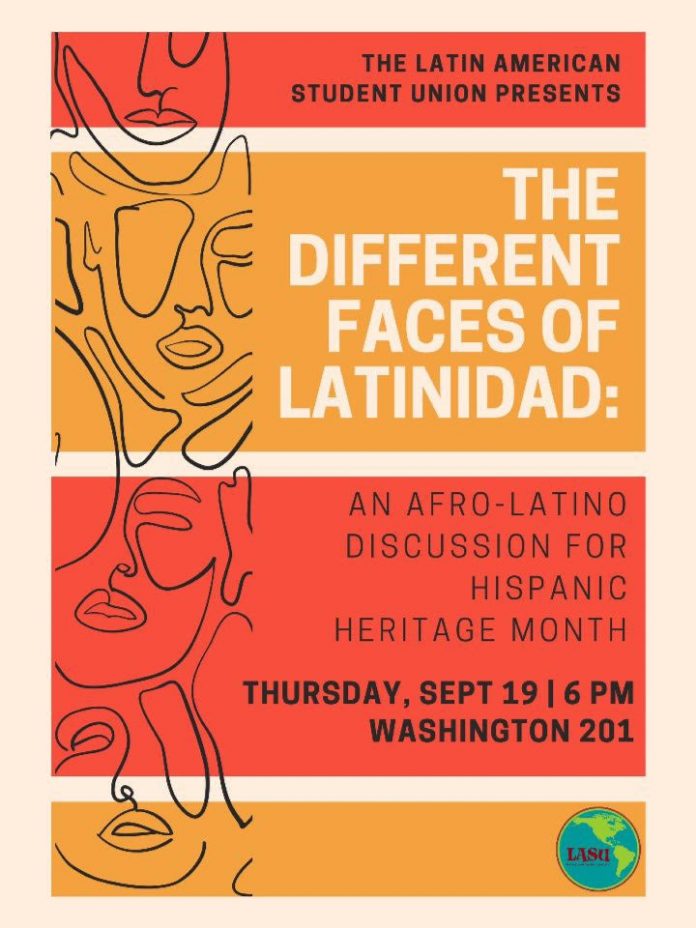Thursday, Sept. 19, the Latin American Student Union put on its major event for Hispanic Heritage Month, an open discussion titled “The Different Faces of Latinidad — An Afro-Latino Discussion.” The goal of this event was to serve as a dialogue — more specifically, an exchange of ideas and information. LASU Co-President Diego Rodriguez Cabrera ’20 introduced the discussion as “an effort to get back to our roots and highlight the spectrum of Latinidad.”
LASU is in its tenth year as an organization at the College of William and Mary. The mediators and academic experts for the discussion were Professor John Riofrio of the Hispanic studies department and associate professor Monika Gosin of Africana and Latin American studies. These experts noted that there appears to be an uptick in the organization’s presence on campus this year, a highlight especially for this Hispanic Heritage Month. Rodriguez Cabrera emphasized the need to celebrate Hispanic heritage, particularly in the current political climate.
“I think that this Hispanic heritage month is especially important because as we have seen under this specific administration, the Latinx community has been a target of a lot of attacks,” Rodriguez Cabrera said. “A lot of our legal protections have been revoked, our children have been put in cages, and just division in this country seems too great.”
The event included both large and small group discussions. Those in attendance would first break out into small groups to discuss definitions and themes. After a few minutes, everyone would come back together to discuss as a whole. Members were encouraged to have an open mind and listen to other people, as well as contribute their own thoughts and opinions.
Topics of interest during the dialogue included race, ethnicity, discrimination, racism, nationalism and privilege. During small group discussions, members began by discussing the definitions of terms before diving into what these concepts represented. Some groups discussed boundaries and lines, while others focused on the concept of identity and how these topics may deviate from more “traditional” definitions.
Race was defined as a grouping of humans based on shared physical or social qualities into categories generally viewed as a distinct body. One attendee brought up the idea of race as a social construct and how people often treat race and ethnicity as interchangeable terms, to which many others in attendance nodded along in agreement. This led to a conversation regarding the real-life consequences that surround concepts such as race and ethnicity. Rodriguez Cabrera spoke to how the discussion brought to light the spectrum of Latinidad.
“We are actively highlighting…and educating others on it, and, at the same time, being educated ourselves, because by no means are we experts about anything we talk about,” Rodriguez Cabrera said. “This is a dialogue so it is a back-and-forth; we are talking with everybody, we are learning just as much as they are, and this is really just an effort to hammer that point.”
Another focal point of the discussion was deconstructing and understanding Afro-Latinidad. Afro-Latinidad is the identity for someone who acknowledges both African and Hispanic identity. There is neither one definition nor a single correct way to define this identity.
“We really want to highlight the spectrum of Latinidad,” Rodriguez Cabrera said. “Afro-Latinos, sadly, are an underrepresented group even within the Latinx community, and it’s something that is often not addressed or talked about or acknowledged within our communities. So this is one of the ways that we’re highlighting the spectrum of Latinidad.”
The idea that internal and external definitions for identity can differ sparked a discussion. Similarly, the notion of colonialism and an inherited a legacy around race and ethnicity served as a foundation for debate. An overarching theme of each discussion was the expression of culture and identity.
“We’re going to … hopefully talk about colonialism, dismantling it and just loving one another and appreciating one another for all of our beautiful and intersecting identities,” LASU vice president Alexia Kaelber ’21 said.
Throughout the dialogue, students asked a series of complex questions and provided responses that were insightful, genuine and able to be built upon by others. The discussions served as a medium to highlight underrepresented minorities within the Latinx community, educate attendees on different elements of the spectrum of Latinidad and recognize the contributions of other members of the Latinx community.
“It’s definitely a recognition of all of the contributions that the Latinx community has given to us,” LASU Marketing Chair Briana Jimenez ’20 said. “Not only to the people, but just to the world. So many awesome contributions, the history of it, really just an awesome recognition. Really something that should occur all year long, but this month really is a month where we are really able to do that.”
LASU hosts many events for the College community, from cultural celebrations to traditional food sales to whiteboard tabling. The organization’s goal for the next few weeks is to encourage students to discuss why and how they celebrate Hispanic Heritage Month.
“There is a community of Latinx identifying students here,” LASU Co-President Rosemary Guardado ‘21 said. “Although we may be really small in terms of population and everything, we are here to stay and we just want to like let everyone know that we’re here. … We have very colorful cultures and everything, and we just want to share our culture with everyone.”

